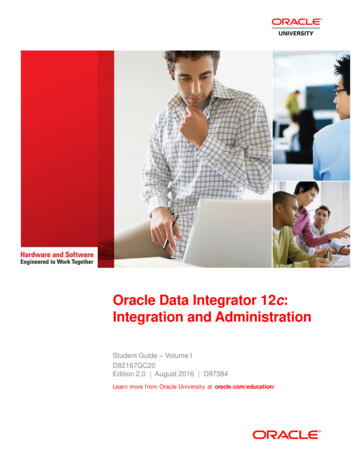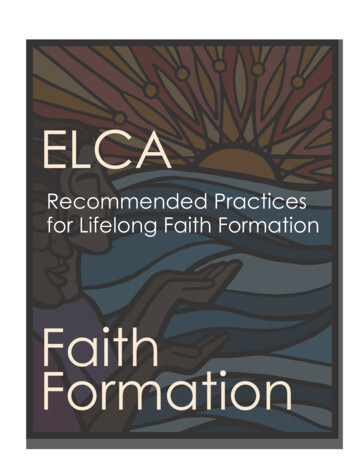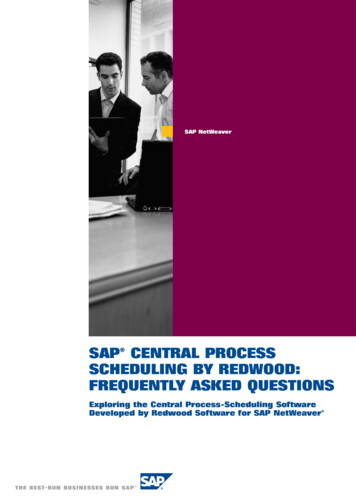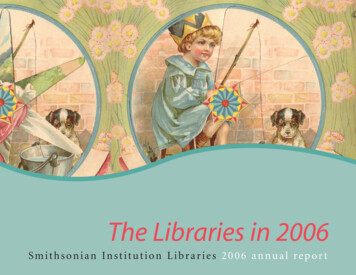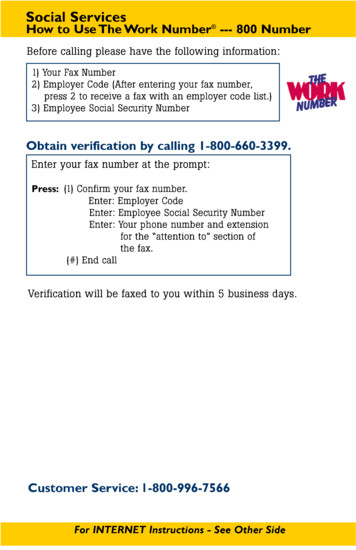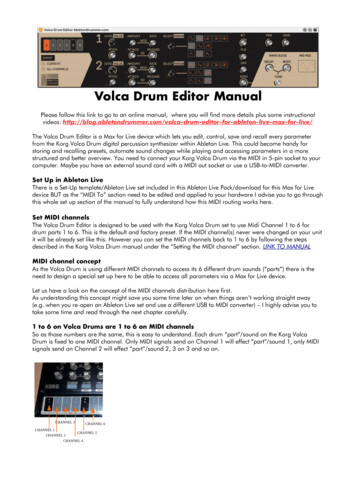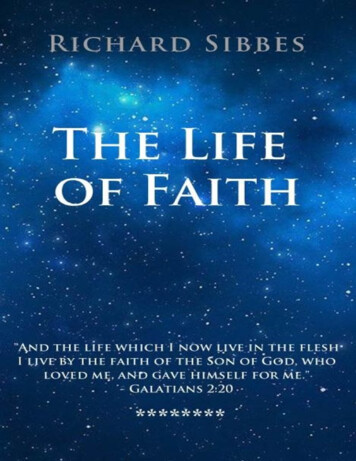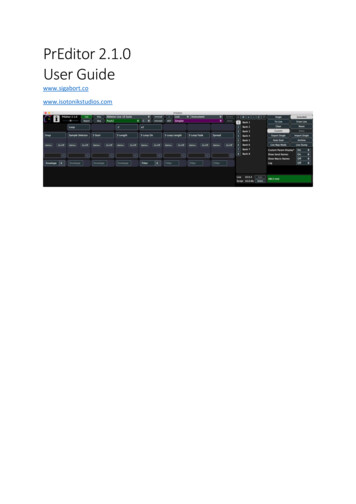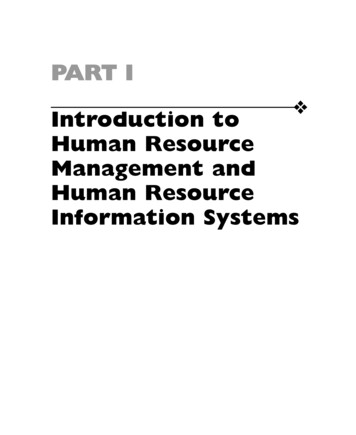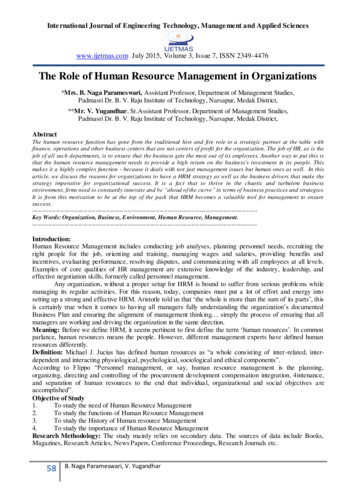
Transcription
efr eLive1
growjoyous, abundant generosityin your congregationAs members of the ELCA, we believe that we are freed in Christto serve and love our neighbors. How do we respond to God’scall to serve and love our neighbors?We faithfully steward the gifts God has so abundantly given to us. Good stewardship is abouthow we use all that God has entrusted to our care — our time, our talents and our treasures —to love God and our neighbors, both inside and outside of the church walls and our homes.As you focus on your congregation’s stewardship ministry, there are numerous resources andservices available to you through the ELCA churchwide office. Whether it’s coaching, monthlyinspiration delivered to your inbox or themed materials to inspire your congregation, you’ll beamazed by the many offerings that can help you grow joyous, abundant generosity.FOR MORE INFORMATION:Please contact your synod office, or visit www.ELCA.org/stewardship,or e-mail stewardship@elca.org2
ContentsVolume 172From the ESC Executive Director3Life That Really is Life6What is Freedom?8Financial Freedom: A Journey to TransformationCenter InsertMarcia ShetlerLive FreeSara AlvarezHampton Morgan Jr.Nathan Dungan10 Surprised by FreedomScott Rodin12 Live FreeLaurel Johnston14 Raising a Grateful ChildRich Melheim16 Live Free: Discover, Develop, and DeployAnthony Bailey18 Relationships Fuel Mission GivingBased on an interview with Chris Culbertson by Sara Alvarez20 Gift Planning: Plan Well!Herb Gale22 Building a Foundation for a Fund-Raising CampaignMarcia Shetler24 Living Free: Proclaiming the Good News About MoneyGrace Duddy Pomroy26 The Gardeners of Creation: Engaging Our Youth inStewardshipJohn Campbell28 The Why and How of Stewardship for ChildrenDelia Halverson30 Resource ReviewsGiving: Growing JoyfulStewards in Your Congregationis published annually by theEcumenical Sterwardship Center.All scripture referances are fromthe NRSV unless otherwise noted. 2015 Ecumenical Stewardship Center,101 Quaker Hill Drive, Richmond, IN 47374Phone/Fax: (855) 278-4372 (4ESC)Email: urces.orgGiving1
From the ESCExecutive DirectorMarcia Shetler“For freedom Christ has set us free. Stand firm, therefore, and do not submitagain to a yoke of slavery.”– Galatians 5:1Christians should live and act like the freest people on earth. The CompleteJewish Bible says it this way: “What the Messiah has freed us for is freedom!” Finda good steward, and you’ll discover a person who understands this freedom inChrist. They realize that their economic status does not define them. They knowthat true riches will not be found in their bank accounts. They freely and wiselygive away what they’ve been given as agents of change and as God’s ministersof restoration and redemption. They have a mindset focused on abundance,not scarcity. These characteristics allow them to freely and joyfully seek God’skingdom and God’s righteousness and to find rest for their souls in fellowship withour Savior whose yoke is easy and burden is light.Living free as God’s stewards includes recognition and celebration of God’spresence in all of God’s children. The Ecumenical Stewardship Center lives out itsmission and vision with a view of ecumenism as God’s gift. Our resources reflectthe richness of the wider wisdom of God’s family through writings by leaders fromacross the North American church.Giving volume 17 is the first issue of a planned four-year series based on ITimothy 6:18-19: “They are to do good, to be rich in good works, generous, andready to share, thus storing up for themselves the treasures of a good foundationfor the future, so that they may take hold of the life that really is life.” Each yearalso will have a sub-theme: Live Free, Live Simply, Live Generously, and LiveCourageously. Articles in the first half of this Live Free volume provide reflective,thoughtful essays on how we can experience freedom in Christ through faithfulstewardship and generous living. In the second half, you will find articles that willincrease your understanding of the many ways to give that are available to us,and that provide ideas for persons from all generations to become more generousgivers and faithful stewards.The stewardship emphasis in the center section offers guidelines for creatingfour worship services and special meal events around the theme of Live Free.Ideas for using social media, creating audiovisual components, and involvingchildren and youth are included, as well as additional resource suggestionsfor each week. You can enhance your stewardship emphasis even further withadditional Live Free resources from the Ecumenical Stewardship Center—see theback cover for more information.The writer of Hebrews exhorts us to lay aside every weight that keeps us fromcompleting the race set before us. It is my hope, and the hope of the EcumenicalStewardship Center Resource Editorial Team, that this magazine and otherresources will help your congregation truly live free, ready to receive and give allthat God has in store for you and your mission and ministry.2GivingMarcia Shetler, Executive Director/CEOEcumenical Stewardship Center
LifeThatReally isA four-year plan for faithful livingLifeSara AlvarezAs the news editor at Mennonite Mission Network, I encounter lots ofpeople who are freed because of their faith in God. Lynda HollingerJanzen, a writer at Mission Network, wrote one of my favorite storiesabout people who were freed from anxiety about the future because oftheir faith in God.Mawuli, a young woman who lived at La Casa Grande, a nonprofit children’shome in Benin, dreamed of becoming a journalist or lawyer. She studied hard anddid well in school, but she needed a birth certificate so that she could take a testthat would let her go to university. Since both of her parents had died, she needed tofind their families in order to create a birth certificate.Giving3
Are youliving a lifethat reallySo she prayed, and three staff members from La CasaGrande—Bienvenu Kadja, the assistant coordinator anddirector of finances; Placide Hounsokpo, sociologist; andEliane Dangboué, secretary—made it their mission to helpher follow her dreams.First, they went to her mother’s village and found hergrandmother. Her grandmother was still very angry withMawuli’s mother and didn’t want anything to do withMawuli. But, as she was yelling at the staff members,she let slip Mawuli’s father’s family name and where hisfamily lived.When the staff arrived at Mawuli’s father’s familyhome, an uncle said, “Do you have news of Mawuli? Wehave been looking for her for ten years.”The next step to get Mawuli’s birth certificate was toget both families to appear in court. The staff at La CasaGrande called both of the families but didn’t tell them theother family would come too. Then, the staff prayed thatGod would work to finish the process.On their way to the court appearance, the mother’sfamily got into a boat to cross a river. Just as the boat leftshore, the ferryman noticed another group approach, sohe turned around the boat to pick them up. As the twogroups got to know each other, they realized that theywere both going for the same reason. The coincidenceseemed so miraculous that they embraced and reconciled.Now Mawuli had a family, but she still had to wait onher birth certificate to get finalized. Normally, the processtakes three months, but God provided another miracle.The court date was on a Friday, and the birth certificate4Givingwas ready on Monday.“God is powerful,” Mawuli said. “I know God has a planfor my life, because I received an unexpected miracle.”She can continue her education now. She is free to followher dreams.The Bible has many examples of people whose faithin God frees them to live a meaningful life. The themecomes from 1 Timothy 6:17-19, where Paul explains toTimothy that the rich people in Timothy’s church shouldstay humble. They needed to trust and look to Godinstead of on their riches because the value of riches willalways fluctuate. If the people would place value on theirrelationship to God, they would start to behave differently.Their values would change. They would become rich ingood works and generosity and could take hold of the lifethat really is life.When the hemorrhaging woman touched Jesus’s cloakin the story from the Gospels, his miraculous powerhealed her. After Jesus felt his power escape from hiscloak, he turned around and assured her, “Daughter, yourfaith has made you well; go in peace, and be healed ofyour disease” (Mark 5:34). When she left the crowd thatday, she was free.This issue of Giving magazine is the first in a fouryear series on the theme Life That Really Is Life. In thefirst year of the series, the magazine will focus on whatit means to be free from the things that hold us back.Consumerism, anxiety about money, and tension abouttime are all things that can take over our lives and lockus into unhappiness. This issue will explore how we can
Ecumenical Stewardship CenterProducts and Services ListingAs a Network for Growing Stewards, the Ecumenical Stewardship Center providesresources, events, and services to support the stewardship and philanthropic ministriesof congregations, judicatories, denominations, and their leaders. Many organizationsand businesses have ministries that complement the mission and ministry of theEcumenical Stewardship Center. Please consider enhancing your stewardship andphilanthropic ministries through the products and services offered by the organizationsin this listing. You can also find this listing on the Ecumenical Stewardship Centerwebsite at ting.DiscipleData, Inc. 317-713-2413 ddi.orgis life?become free and how that freedomaffects our lives.In the next three years, theissues will focus on simple living,generosity, and courageousness.Each year builds on the year beforeand can be used as a series inchurches. Freedom from this worldleads to a simpler life, which gives usmore of ourselves to give generouslyand become courageous. But eachissue can also be used to standalone without the others. You couldswitch the order or use them in otherways that match the needs of yourcongregation.Our hope is to provide a resourcethat can be useful for long-termengagement. Congregations canexplore what it means to be goodstewards of their lives and how Godis calling them to live.Are you living a life that reallyis life?Sara Alvarez is news editor for the MennoniteMission Network and a member of theEcumenical Stewardship Center ResourceEditorial Team.DDI is a nonprofit cooperative serving the technology needs of faith-basedorganizations since 1972. Our DDI-Connect software provides a single databaseto manage your core financials, donors, fundraising, gift processing, CRM, projects,processes, church loans and investments and much more. Everything is fully hosted byDDI in our world-class data center to ensure your data is secure and available anytimefrom any location. Our clients are able to focus on their mission and ministries insteadof costly and rapidly changing technology.Kairos and Associates, Inc. 800-851-3019 Kairosandassociates.comThe core purpose of Kairos is to help Christian churches and ministries realize theresources needed to achieve their dreams. We work with congregations, synods andnon-profits to inspire generosity and fulfill purpose through visioning, capital fund/debtreduction appeals and stewardship ministry development. Our holistic and integratedapproach to this work not only maximizes the potential for generous giving it lays thefoundation for long term growth and vitality. Contact us to share your story and findout how we can help you accomplish your ministry goals and bring lasting change toyour congregation, synod or non-profit.Marcuson Leadership Circle 503-701-7621 Margaretmarcuson.comThrough coaching, consulting, and printed and electronic resources, the MarcusonLeadership Circle helps clergy and churches energize their ministry and fund theirvision to help clergy by becoming more thoughtful about the financial challenges theyface, seeing money and leadership strategies from a different perspective, bringingmore calm and creativity to recurring and unexpected problems in funding ministry,concentrating on long-term ministry goals and strategic persistence to get financialsupport for those goals, and reducing their overall stress about stewardship andchurch finance.NCS Services, Inc. 901-230-5200 ncsservices.orgE-giving powered by NCS Services is the most comprehensive online donationplatform and suite of products and services available to churches, nonprofits andschools. Built by experts in serving nonprofits of all types, e-giving is the perfectpartner for your online donation needs. From accepting donations via text giving, onlinegiving and kiosk giving, to creating customized event registrations, to providing youwith a dedicated Customer Relationship Manager, e-giving powered by NCS Services iscommitted to helping nonprofits leverage technology successfully and effectively.(Businesses and organizations in the Products and Services directory have paid a feefor inclusion. Please reach out to the Ecumenical Stewardship Center at 800-278-4ESC(4372) or office@stewardshipresources.org for more information about inclusion in theProducts and Services Listing.)Giving5
What IsFreedom?Hampton Morgan Jr.The seven guard towers can be seen from a mileaway. They never disappear from view the restof the way. When you enter the parking lot,razor wire commands your attention. There arehundreds of yards of it as far as you can see, triple rollssitting atop a fence that must be twenty feet high.Welcome to the United States penitentiary where Iminister several days a week. Fifteen hundred males areincarcerated in this high-security facility; another 125are housed in the unlocked satellite camp a half-mileaway. “Up top,” as everyone calls the penitentiary, the6Givingmajority of the inmates are drug offenders, and a sizeablenumber are in for violent crimes as well. Down below, thepopulation consists mostly of white-collar criminals—men serving time for various kinds of fraud and othernonviolent crimes.At the penitentiary, I pass through a security screeningfamiliar to anyone who has ever been inside a prison inthe United States. Next, an officer in the control roomhands me my badge, and a chaplain or administrativeassistant escorts me 400 yards down a long, emptycorridor or through the outdoor compound to a room in
the Religious Services Department.Unpainted gray concrete walls are everywhere. Menin khaki prison issue respond to orders to move from cellblock to dining to classroom to recreation to work or toreligious activities according to a schedule held hostage tothe realities of prison life—fog, fights, and the suspicionsof correctional officers. Last year an officer was brutallymurdered by an inmate. No moves took place for sevenweeks; the prison was in lockdown.Of all the words that come to mind from the moment Isee the guard towers until I am left alone in the chapel toawait the arrival of the class participants, living free arenot among them. This is a dark place of incarceration. Itis a graphic and disturbing illustration of the “involuntaryservitude . . . as a punishment for crime” contained in theThirteenth Amendment.The last few words of 1 Timothy 6:19 seem tocome from another world: “Take hold of the life thatreally is life.”In this place where all are held captive by theunbending demands of retributive justice, I have met menwho, defying the odds, have done just that—taken hold ofthe life that really is life. I have watched as others beganthe journey from an imprisonment of mind and spirit to afreedom of living more vibrant and real than what somewho are not in prison ever experience.I sit at a table waiting for some of them to arrive. Ihear the voice on the loudspeaker: “Red side: recreation,education, religious services!” Men begin to come in. Fiveor ten minutes later, a similar announcement is made forthe blue side. More men arrive.A dozen of us are at the table now. Several followJesus, two are Muslim, and the others have not identifiedtheir faith. Three of them are serving life sentences formurder; one, for piracy. Why are they here with me for thenext hour and a half?Forgiveness. They are here to consider, debate and, insome cases, agonize over what forgiveness could meanfor them now and in the future. Each one brings a story:“My codefendant ratted on me, and I will neverforgive him.”“My father was a violent man who beat me when I wasa child. I hate him.”“My uncle sexually abused my daughter. If I wasn’there, he would be dead.”“I let myself down by the stupid things I did, and I can’tforgive myself.”“My daughter hates me and refuses to communicate. Iwant her to forgive me.”For many weeks we will gather to peel back the layersof pain, anger, and hate. Those who are further along inthe journey to forgive will bear witness to what helpedthem. A fellow traveler, I will tell some of my stories too.It is all serious business.Painful memories, strengthened by anger andbitterness, are like chains that bind us to the past. Forthose in prison, it is double incarceration. Forgiveness isa courageous choice to disarm the power of the memoryand begin to take hold of life. When we forgive, weimitate God, the Consummate Forgiver of all time, who isgenerous in love and lavish with grace.Practicing forgiveness gives birth to generosity in otherareas of life. One inmate who felt keen bitterness towardhis prosecutor eventually forgave her. A follower of Jesus,he soon began a storehouse of toiletry items donated bythe brothers to give to newly arrived inmates. Others whohave completed the forgiveness project have purchasedfood items from the commissary to share with otherinmates they invite for the occasional movie night.Once I had a rare hour, one-on-one with an inmatesoon to be released who had taken the class but wasstill burdened by guilt and shame. Though he was ofa faith different than mine, we talked about sharedunderstandings of God’s forgiveness. At the end he said,“This was the single most important hour in my threeyears here.”Forgiveness, extended and received, both softens andstrengthens us. It has the power to break through themorbid focus on our own pain and open our eyes to seethe needs of others. It empowers us to change the futurefor others, and ourselves, with generosity and grace.Now in his retirement years, Hampton Morgan Jr. is executive director of Choosing Integrity, a non-profit involved in inmate reentry, through whichhe leads forgiveness projects in a county and federal prison. He previously served as executive director of the international mission agency of theMoravian Church in America and as pastor of Moravian congregations in the U.S. Virgin Islands and North Carolina.Giving7
FI NANCIAL FREEDOM:A Journey to TransformationNathan DunganFreedom is at the heart of the democraticexperiment—be it in the United States, Canada,or developing countries around the world.Freedom comes in many forms: freedom ofspeech, freedom of religion, and freedom of the press, toname a few.To fully realize freedom requires ongoing introspectionand public debate about what is right and just. Alltoo often, we take our freedom for granted. It can bea sobering reminder when you read about people incountries who are oppressed and unable to vote or freelyexpress their opinions.What defines financial freedom? It depends. For someit’s a fair wage, affordable housing, basic transportation,and health care. For others it’s a well-funded retirement,a home without a mortgage, the ability to take a vacation,and an occasional meal at a favorite restaurant. To besure, financial freedom is in the eye of the beholder.In my twenty-plus years of thinking, writing,researching, and speaking about the many dimensionsof financial freedom, I’ve come to understand howcritical it is to be proactive in this pursuit. In the worldof personal finance, passivity is catnip for the singlegreatest challenge to financial freedom: the hyperconsumer culture.The more we back-burner discussions about moneyand values in our homes and faith communities, themore susceptible we are to the onslaught of 5,000daily advertising impressions. Left unchecked theseimpressions both create and reinforce the false narrativethat spending money leads to happiness and fulfillment.Passivity has consequences, far beyond the obviousfinancial ones of a subpar credit score or an underfundedretirement. From the annual Stress in AmericaTM studypublished by the American Psychological Association, weknow that money is the perennial number-one source ofstress in our lives. We also know that stress is the leadingcause of negative health outcomes like heart disease,diabetes, and insomnia.To be clear, these are not new trends. The medicalcommunity has been keenly aware of these correlations8Givingfor many years. And yet their typical recommendationsfor managing stress are to increase physical activity,meditate, or take a pill. As someone who believes inand practices mediation and various forms of physicalexercise, I know these alone are not the answers forimproving our financial well-being.We’ve known about the correlation between moneyand stress for some time, so why we haven’t been able tomove the needle on this troubling trend? My assessment isthat we’ve done far too little to properly engage, educate,and equip individuals and families when it comes tomoney and the role it plays in their lives.Enter faith communities.From my experience faith communities, especiallycongregations, are uniquely positioned to step into thevoid of money silence. Churches are one of the fewplaces where individuals and families from a varietyof socioeconomic and cultural backgrounds as wellas various ages and life experiences convene on aregular basis.The key to success for congregations is to subrogatetheir organizational financial needs (i.e., the annualstewardship drive) and, in turn, prioritize the financialjourneys of their members, both youth and adults. Whencongregations convene learning experiences that honoreach individual’s unique financial journey and let themspeak into issues and challenges they face in a safe andnonjudging environment, amazing things begin to happen.Journey to TransformationHerb Miller, a highly regarded stewardship leader, said,“Hope without a plan is denial.” Church leaders may hopethe many issues related to consumerism will improveover time, but that is magical thinking. Individuals andfamilies need congregations to be bold and step into theseissues today.Being effective will require strategic thinking anda well-thought-out plan. If you too believe the topic ofmoney and the related stresses and cultural pressurescomprise the greatest spiritual challenge of the twentyfirst century, then act with a sense of urgency.
Transformation is hard work and will absolutely testyour resolve. The consumer culture is betting that youwill lose interest. But as we found in our research withfamilies, when you stay the course and offer a narrative ofabundance, amazing things will happen.Here are five ideas to help your congregation seize theopportunity and be a force for transformation. Step into the learning zone. Too often we chooseto stay in our comfort zone, even when it yieldsless than optimal outcomes. When you step into thelearning zone, especially around money issues, youneed patience, courage, and unwavering leadership. Craft a strategic action plan. A well-thought-outplan that prioritizes convening learning experiencesfor youth and adults is your roadmap for the future.Identifying specific action steps with measurableoutcomes will help you avoid the trap of flavor-ofthe-month thinking. Don’t put a sign-up sheet in the narthex. Infuse thelearning into a broad cross section of existing faithformation groups: Sunday school, confirmation,small groups, and adult education. Think big, start small. It’s great to have highexpectations, and yet it’s important to take thelong view on engaging people in your congregationand community. Invite youth and adults to be leaders. Ourexperience suggests that when you engage youthand adults in the learning experience, they are morelikely to take ownership and be willing to lead theirpeers in the learning journey. Bonus idea. Lift up and support the important workof organizations like Campaign for a CommercialFree Childhood that work for the rights ofchildren to grow up—and the freedom for parentsto raise them—without being undermined bycommercial interests.Nathan Dungan is the founder and president of Share Save Spend . For over 20 years, he has worked with thousands of individuals and familiesto help them align their values with their money decisions. He speaks and consults nationally about the impact of the consumer culture onmoney habits and values. Money Sanity U is Nathan’s newest resource for organizations. This subscription-based virtual learning library isdesigned to improve individuals and families financial wellbeing by addressing money topics in a simple and interactive format. He is the authorof three books and numerous resources including Prodigal Sons and Material Girls: How Not to Be Your Child’s ATM. For more information visitsharesavespend.com.Giving9
SURPRISEDBYFREEDOMScott Rodin“Command them to do good, to be rich in good deeds,and to be generous and willing to share. In this waythey will lay up treasure for themselves as a firmfoundation for the coming age, so that they may takehold of the life that is truly life.”W1 Timothy 6:18-19, Today’s NIVhat does Paul mean by the term “life that is trulylife”? What other life would we seek to “takehold of”? The implication is that any other formof life that is not founded on generosity and adesire to be rich in good deeds is counterfeit life. That isa powerful and disturbing teaching. Are we willing to takeit seriously? If so, we may be surprised by the message ofhope that lies within it.To unlock the surprise, let’s look briefly at thetheological thread that links Genesis 1-3 with John 8 (andscores of other verses). The creation story is all aboutlordship. The first couple was provided for in every way.God created a world perfectly suited for them and askedsimply that they trust his good will and love for them. Hewanted only their undivided love in return. He createdthem to be one-kingdom people who worshiped onlyone Lord.The temptation in Genesis 3 is a subtle yet powerfulattack on that lordship. The enemy first plants a seed ofdoubt into Eve’s mind regarding the absolute goodness of10GivingGod. “Why would a God who loved you plant a forbiddentree in the garden? What is he hiding from you?” Hethen presents an alternative understanding of creation.“Perhaps there are many things God has kept from you.Your eyes have not yet been opened. Don’t you wantto know what God is withholding from you?” As Evecontemplates the possibilities, he takes her to the finalstep of rebellion.“You will be like God.”There it is, the progenitor of all the evil and sin thatwas about to invade the sphere of creation. From thisone alien desire—what Karl Barth called the “impossiblepossibility”—humanity’s rebellion was unleashed toravage the world up to our day. It was the desire to be ourown god and practice our own form of lordship over ourown kingdom that ushered evil into the sphere of God’sperfect creation.Since that moment, all of us who have been born ofthe flesh have been natural second-kingdom builders.We love to play the owner, define things as “ours” andexercise control over as much of life as we can. We buildour kingdoms out of the stuff we refuse to surrenderto God: our reputations, our time, our future, ourrelationships, our possessions, and so on. If we are honestwith ourselves, we must confess that we are all secondkingdom builders.
There is a definite reward for us as we build andprotect our little kingdoms. Playing the lord and seekingto control these unsurrendered parts of our life willreward us with absolute bondage. Here is what it lookslike in my life. I can trace every feeling of stress, anxiety,fear, dread, doubt, and discouragement directly back tosomething I am trying to control as part of my secondkingdom. Put another way, I have never experiencedany of these feelings as a result of something that hasbeen fully surrendered to Jesus Christ as a citizen of thekingdom of God. What we seek to control ultimately endsup controlling us.That is the enemy’s dirty little secret. Everything theworld tells us will bring us happiness ends up puttingus in bondage. The life we are so frantically pursuing iscounterfeit. It is not the life for which we were redeemedin Christ and it will ultimately rob us of the freedom andjoy for which we were created.So what is the answer to this dilemma? How orwhere do we find that life that seems so impossible toexperience in this fallen and falling culture? For thatwe can look to John 8. Jesus is proclaiming his Sonshipto the Jewish leaders, a message that all but sealed hiscrucifixion. In doing so he has the audacity to say tothem that he represents a new kind of freedom neverknown before. It is liberation not from Roman rule butfrom self-rule. It results not in political or socioeconomicsovereignty but in a total surrender as a citizen of thekingdom Christ came to inaugurate.His message is clear: “You will know the truth, and thetruth will set you free” (v. 32 NIV).The truth is the comingof this kingdom in the life, death, and resurrection ofJesus Christ. The truth is the freedom to set aside all ofour second-kingdom-building ways and follow this oneLord. The truth is that in this new kingdom we trust Godto be our sole provider, experience more joy in giving thanreceiving, and understand that true riches are found in thegood deeds we do in loving our neighbor as ours
24 Living Free: Proclaiming the Good News About Money Grace Duddy Pomroy . our Savior whose yoke is easy and burden is light. Living free as God’s stewards includes recognition and celebration of God’s . seemed so miraculous that they embraced and reconciled.
